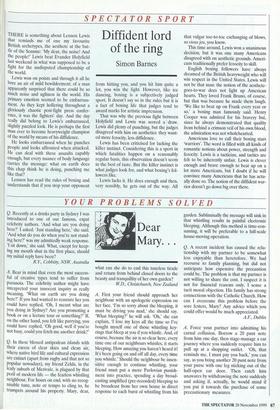SPECTATOR SPORT
Diffident lord of the ring
Simon Barnes
THERE is something about Lennox Lewis that reminds me of one my favourite British archetypes, the aesthete at the bat- tle of the Somme: 'My dear, the noise! And the people!' Lewis beat Evander Holyfield last weekend in what was supposed to be a fight for the undisputed championship of the world.
Lewis won on points and through it all he bore an air of mild bewilderment; of a man apparently surprised that there could be so much noise and ugliness in the world. His primary emotion seemed to be embarrass- ment. As they kept hollering throughout a gloriously chaotic post-fight press confer- ence, it was the fighters' day. And the day really did belong to Lewis's embarrassed, slightly puzzled look. He is perhaps the first man ever to become heavyweight champion of the world by means of his diffidence.
He looks embarrassed when he punches people and looks affronted when attacked. He can deal with these assaults capably enough, but every nuance of body language carries the message: what on earth does this chap think he is doing, punching me like that?
Lennox has read the rules of boxing and understands that if you stop your opponent
from hitting you, and you hit him quite a lot, you win the fight. However, like ice dancing, boxing is a subjectively judged sport. It doesn't say so in the rules but it is a fact of boxing life that judges tend to award marks for artistic impression.
That was why the previous fight between Holyfield and Lewis was scored a draw. Lewis did plenty of punching, but the judges disagreed with him on aesthetics: they want- ed more ferocity, less diffidence.
Lewis has been criticised for lacking the killer instinct. Considering this is a sport in which fatalities happen on a reasonably regular basis, this observation doesn't seem in the best of taste. But the killer instinct is what judges look for, and what boxing's fol- lowers like.
Lewis lacks it. He does enough and then, very sensibly, he gets out of the way. All
that vulgar toe-to-toe exchanging of blows, so vieux jeu, you know.
This time around, Lewis won a unanimous decision, but it was one many Americans disagreed with on aesthetic grounds. Ameri- cans traditionally prefer ferocity to skill.
English boxing followers have always dreamed of the British heavyweight who will win respect in the United States. Lewis will not be that man: the notion of the aesthete- goes-to-war does not light up American hearts. They loved Frank Bruno, of course, but that was because he made them laugh. 'We like to beat up on Frank every year or so,' a boxing man famously said. Henry Cooper was admired for his bravery but, since he always demonstrated that quality from behind a crimson veil of his own blood, the admiration was not wholehearted.
Americans love to call their boxing stars 'warriors'. The word is filled with all kinds of romantic notions about power, strength and ferocity. Lewis is a tactician, and tactics are felt to be inherently unfair. Lewis is clever enough and brave enough to beat up on a lot more Americans, but I doubt if he will convince many Americans that he has actu- ally done so. The notion of the diffident war- rior doesn't go down big over there.


























































































 Previous page
Previous page